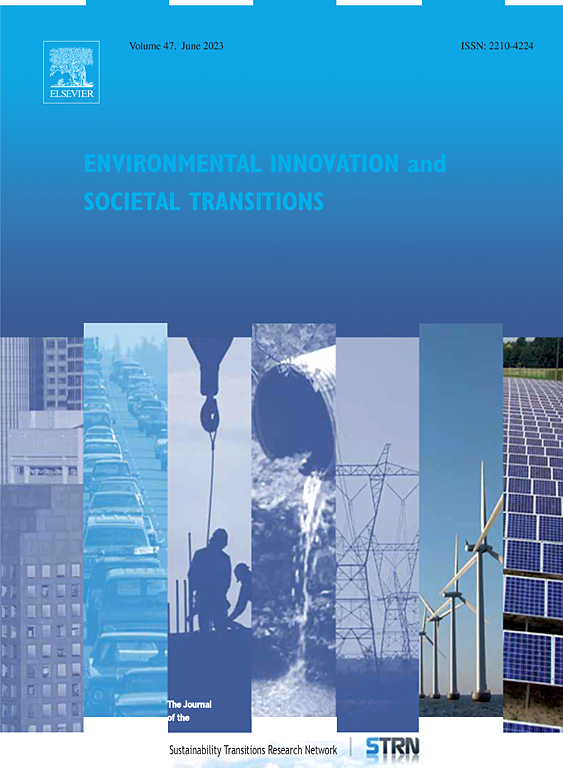Energising the Polis? Analysing transition challenges to energy communities in Greece
IF 6.1
2区 经济学
Q1 ENVIRONMENTAL SCIENCES
Environmental Innovation and Societal Transitions
Pub Date : 2025-09-18
DOI:10.1016/j.eist.2025.101055
引用次数: 0
Abstract
The transition to a more decentralised energy system, by diversifying energy supply, and expanding renewable energy, is a declared EU objective as is evident from the Clean Energy for All Package. The EU has identified Energy Communities as one of the organisational forms that can facilitate this transition. Greece is a critical case within Europe. Research indicates that Energy Communities could help address energy poverty, drive decarbonisation of the energy sector, and contribute to rural development by tapping into the great potential for renewable energy generation in the country. Despite this high potential, Energy Communities are far less widespread in Greece than in many other EU countries. We investigate the policy challenges Energy Communities encounter in Greece. We base our analysis on policy scoping and interviews. We find challenges in all five domains of policy: Directionality, Demand Articulation, Experimentation, Policy Learning & Coordination and Justice. We find that the concept of Energy Communities is oftentimes co-opted by commercial players. Further, a lack of a coherent vision for Energy Communities in Greece and failing policy coordination inhibit a policy mix that can help a just rollout of the concept, leading to a situation where Energy Communities do not deliver the anticipated community benefits.
振兴城邦?分析希腊能源行业面临的转型挑战
通过能源供应多样化和扩大可再生能源,向更加分散化的能源体系过渡,是欧盟宣布的目标,这一点从《全民清洁能源一揽子计划》(Clean energy for All Package)中可见一斑。欧盟已经将能源共同体确定为能够促进这一转变的组织形式之一。希腊是欧洲内部的一个关键问题。研究表明,能源社区可以帮助解决能源贫困问题,推动能源部门的脱碳,并通过挖掘该国可再生能源发电的巨大潜力来促进农村发展。尽管潜力巨大,但与许多其他欧盟国家相比,能源社区在希腊的普及程度要低得多。我们调查了能源社区在希腊遇到的政策挑战。我们的分析基于政策范围和访谈。我们在政策的所有五个领域都发现了挑战:方向性、需求表达、实验、政策学习与协调以及正义。我们发现能源社区的概念经常被商业参与者所采用。此外,希腊能源社区缺乏一致的愿景,政策协调不力,阻碍了有助于公平推广这一概念的政策组合,导致能源社区无法实现预期的社区效益。
本文章由计算机程序翻译,如有差异,请以英文原文为准。
求助全文
约1分钟内获得全文
求助全文
来源期刊

Environmental Innovation and Societal Transitions
Energy-Renewable Energy, Sustainability and the Environment
CiteScore
13.60
自引率
19.40%
发文量
90
审稿时长
56 days
期刊介绍:
Environmental Innovation and Societal Transitions serves as a platform for reporting studies on innovations and socio-economic transitions aimed at fostering an environmentally sustainable economy, thereby addressing structural resource scarcity and environmental challenges, particularly those associated with fossil energy use and climate change. The journal focuses on various forms of innovation, including technological, organizational, economic, institutional, and political, as well as economy-wide and sectoral changes in areas such as energy, transport, agriculture, and water management. It endeavors to tackle complex questions concerning social, economic, behavioral-psychological, and political barriers and opportunities, along with their intricate interactions. With a multidisciplinary approach and methodological openness, the journal welcomes contributions from a wide array of disciplines within the social, environmental, and innovation sciences.
 求助内容:
求助内容: 应助结果提醒方式:
应助结果提醒方式:


